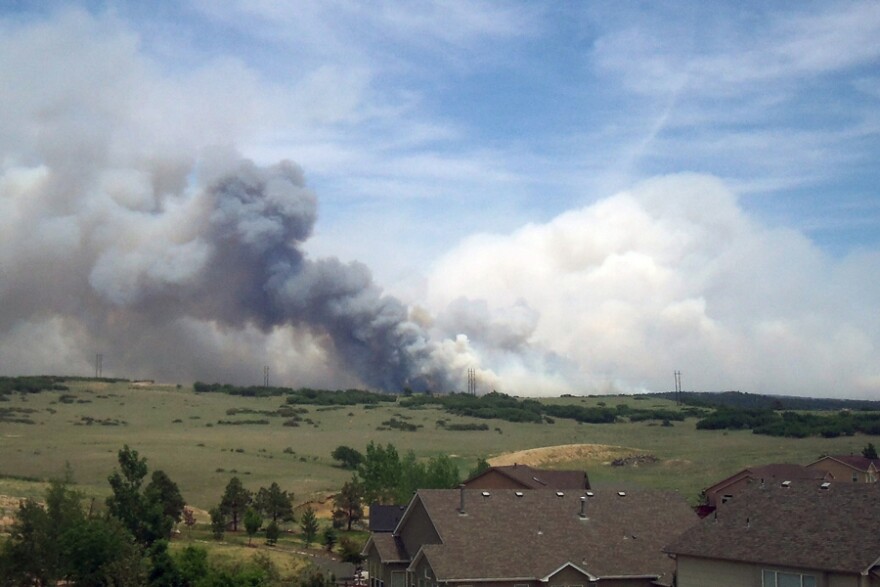Helping prevent and fight wildfires is one of the top priorities for Colorado lawmakers in both parties this session, but so far theyŌĆÖre only proposing minor policy changes.
The measures include everything from providing death benefits for seasonal firefighters killed in the line of duty to an informational wildfire website for the public. A key proposal is a tax credit to help homeowners remove trees from their property.
ŌĆ£The majority of us felt like we could be more effective in motivating people to the mitigation work by providing incentives rather than penalties,ŌĆØ said Senator Jeannie Nicholson (D-Blackhawk). ŌĆ£If you move to the mountains you need to learn how to be responsible for living in the mountains.ŌĆØ
This carrot versus stick approach is something lawmakers and Governor John Hickenlooper can all agree on.
ŌĆ£Lets do the incentives and weŌĆÖll measure our success and then go from there,ŌĆØ said Hickenlooper.
"Fire is here to stay. It's going to get more costly. We're going to continue to see growth. People want to come to Colorado to live in the mountains."
But the GovernorŌĆÖs . They recommended a minimum statewide building code, a fee for people living near forests to cover the costs of fire mitigation and an upgraded mapping system that could show the fire risk on specific properties.
ŌĆ£You need to know what it is your faced with in order to craft solutions that are pertinent and relevant,ŌĆØ said Department of Regulatory Agencies head Barbara Kelley, the chair of the task force. ŌĆ£In our view understanding what the profile of the properties were was one of the first steps in coming to the point of being able to identify that risk.ŌĆØ
Rating fire risk for homes is unpopular with realtors and home builders and many lawmakers including Senator Ellen Roberts (R-Durango).
ŌĆ£Does that depress their property values?ŌĆØ said Roberts. ŌĆ£And yet how do we know the state system is up-to-date? There was a lot of concern at the legislature that, it was going to be used in a punitive way and not even be accurate.ŌĆØ
For task force member Lyle Laverty of the Society of American Foresters the millions of dollars the state spends on fighting wildfires each year is not a good long term strategy, more action is needed.
ŌĆ£IŌĆÖm disappointed because I really feel the issues weŌĆÖre dealing with in Colorado itŌĆÖs going to take some very aggressive action on everyoneŌĆÖs part to address some of the wildfire issues,ŌĆØ said Laverty. ŌĆ£Part of it is just a lot of folks still donŌĆÖt understand the dilemma that weŌĆÖre facing and the magnitude.ŌĆØ
For others on the task force the recommendations are merely a starting point. Some of the contentious measures could take years to build consensus. One of the more ambitious bills would direct the state to create an air tanker and helicopter fleet to fight fires.
ŌĆ£Why are we trying to reinvent the wheel?ŌĆØ said the billŌĆÖs sponsor Senator Steve King (R-Grand Junction) . ŌĆ£Look at what CaliforniaŌĆÖs done. Model it and lets protect our water. This could be a turning point for Colorado on how we handle wildfires. I think this legislature needs to step up.ŌĆØ
So far Democrats , saying an air fleet is too costly and would detract from fire prevention. The Governor though says he is open to discussing a regional fleet.
While legislative actions havenŌĆÖt come to a settlement, everyone does agree itŌĆÖs a complicated problem that deeply affects peopleŌĆÖs lives and any solution will require tough choices.
Carol Ekarius, a member of the GovernorŌĆÖs wildfire task force and the head of the Coalition for the Upper South Platte, a watershed nonprofit, thinks the state will eventually be forced into making larger policy changes.
ŌĆ£The fires are getting bigger and more severe impacts, to private property, public infrastructure, water suppliers and all these types of values,ŌĆØ said Ekarius.
ŌĆ£Fire is here to stay,ŌĆØ Ekarius continued. ŌĆ£ItŌĆÖs going to get more costly. WeŌĆÖre going to continue to see growth. People want to come to Colorado to live in the mountains.ŌĆØ







